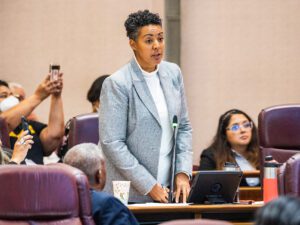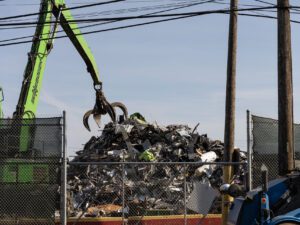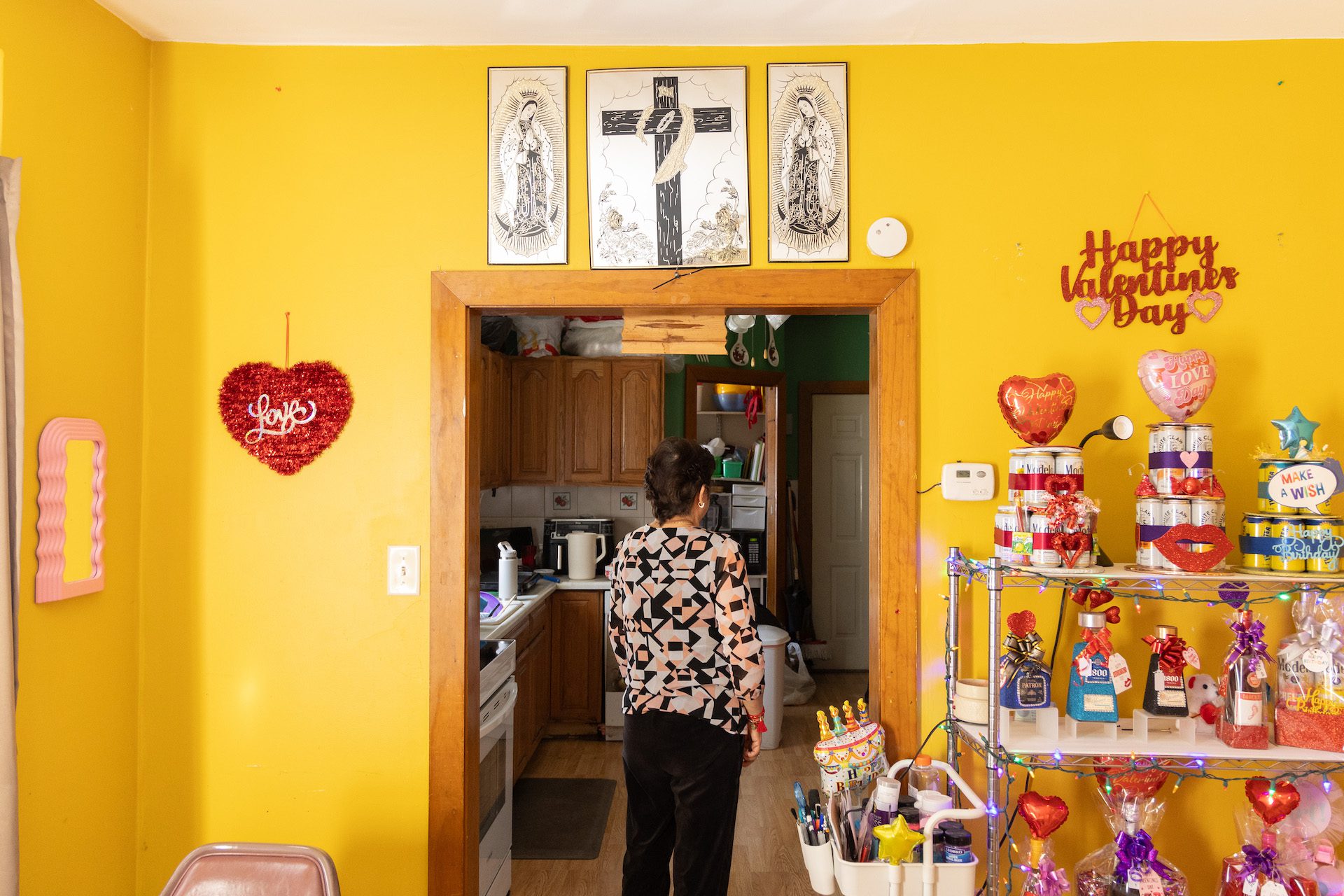 Oscar Gomez/Borderless Magazine
Oscar Gomez/Borderless MagazineThe Illinois Commerce Commission gave Peoples Gas the green light to resume work to replace Chicago’s natural pipelines that pose safety risks with some exceptions.
Angelica Marin, 48, had been a Peoples Gas customer for about 23 years when she received the highest gas bill from the utility company: a $1,000 charge for one month of service.
The large utility bill kept her up at night. For days, she worried whether she could pay such high prices to keep her home warm in the frigid winter months.
After falling behind about five years ago, Marin applied for the utility company’s budget program, which offers fixed monthly bills for customers based on their estimated yearly gas use.
News that puts power under the spotlight and communities at the center.
Sign up for our free newsletter and get updates twice a week.
“On one hand, I am more at peace now because I can stick to a budget, whether it is winter or summer,” said Marin.
But Marin said that peace was short-lived.
Her fixed $75 monthly bill has more than doubled over the last four years, increasing about every year, she said. Marin worries that it will keep growing and become more challenging to pay as she works toward retirement.
“It always goes up, not down, and our income has remained the same,” she said.
Marin is one of more than 890,000 Peoples Gas customers in Chicago who saw their bills increase last year to fund the utility’s effort to replace about 2,000 cast-iron gas lines with new plastic ones through its Safety and Modernization Program (SMP). The gas line replacement efforts have been slow and marked by delays, resulting in increased gas bills for customers.
Now, after a year-long pause on the program and an investigation by the state, Peoples Gas was given the green light to resume the controversial project by state regulators.
On Thursday, the Illinois Commerce Commission (ICC) ordered Peoples Gas to narrow the scope of its program and wrap it up sooner than planned.
“This [investigation] shows Peoples Gas was not prioritizing [a focus on safety] but rather pursued it as one of several components of its system modernization program,” said Stacey Paradis, one of the five commissioners of the ICC.
Safety Modernization Program
Since 2011, Peoples Gas has been working to replace every one of its gas pipelines as part of the “Safety Modernization Program.” The gas provider owns about 2,000 miles of cast-iron pipelines placed underground to transport and deliver methane gas to heat thousands of homes in the city.
The utility company said many lines carrying methane gas into homes are over 100 years old and at the end of their useful lives and need to be replaced as quickly as possible because they risk leaking or rupturing. According to the American Lung Association, human exposure to methane can cause respiratory issues, particularly when inhaled in high concentrations.
Peoples Gas has repeatedly defended the program, citing the urgent need to replace the corroding pipelines, or they’ll become a risk to Chicagoans’ safety and their ability to keep their homes warm during freezing temperatures.
“Construction crews need to get back to the critical work of updating the energy delivery system running under Chicago’s streets — a network of pipes that date back as far as the 1860s,” said David Schwartz, a spokesperson for Peoples Gas.
But over the last 14 years, Peoples Gas has only replaced 38% of pipes. The utility company has spent $3.3 billion on work that has already been completed, and the remaining work would cost $7.2 billion, according to Peoples Gas.
Read More of Our Coverage
Public interest groups criticized the estimates, arguing that the program’s estimated cost had ballooned from $1.42 billion in 2007 to $11 billion eight years later.
Over a year ago, the ICC launched an investigation to examine whether the program, as it is managed, is cost-effective and practical and prioritizes the replacement of high-risk pipes.
The commission ruling on Thursday allowed Peoples Gas to resume its program with some changes, including:
- focus on replacing only certain pipelines that pose the highest safety risks
- hire a “safety monitor” to oversee the pipeline retirement work the ICC ordered until it is completed
- complete the work in the next 10 years — five years earlier than the utility planned
“As we wait to receive the full Final Order and review it, the Commission made clear it wants us to focus on replacing more than 1,000 miles of pipes by 2035,” Peoples Gas said in a statement following the ruling. “This direction given by the Commission, compared to the prior approach, may necessitate additional cost and more construction sites disrupting streets across city neighborhoods.”
Ongoing Saga
The decision favors some Peoples Gas customers and organizations that have long called for the program’s reform, including People for Community Recovery, the Illinois Public Interest Research Group (PIRG), AARP Illinois, and the Citizens Utility Board (CUB), a nonprofit utility watchdog group. These groups argue that the program’s approach before the ICC’s investigation didn’t prioritize safety risks, was expensive and would lead to more rate hikes.
“Today’s Illinois Commerce Commission decision is a victory for Peoples Gas customers and all Chicagoans,” said Illinois PIRG director Abe Scarr. “By refocusing Peoples Gas on cost-effective investments to mitigate safety risks, the ICC has directed Peoples Gas to run a program that costs less, makes us safer, and facilitates the transition to cleaner energy.”
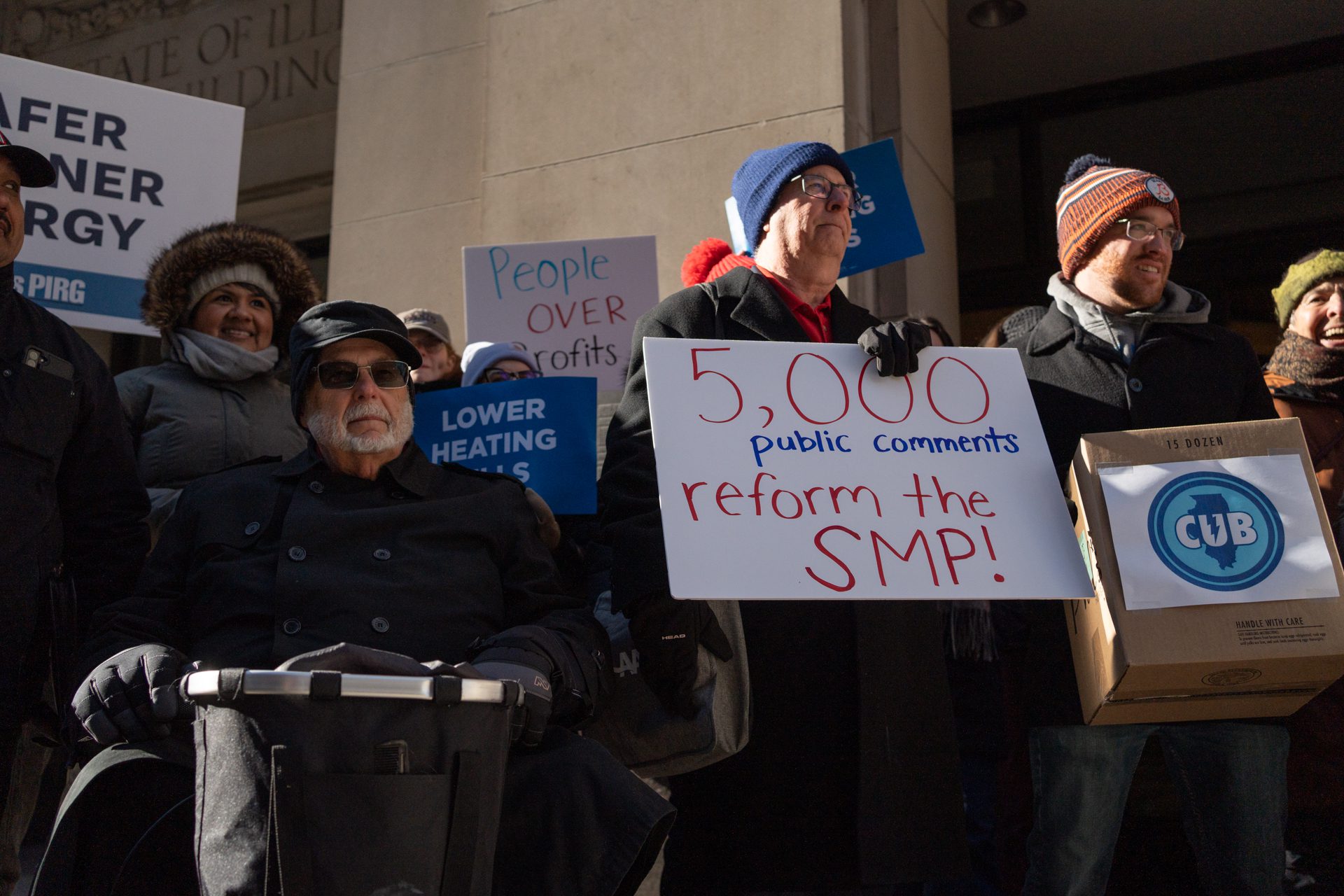
In 2024, Groundwork Data, a clean energy consulting company, released a report on behalf of CUB suggesting that completing the program over the next 15 years would cause annual increases of nearly 7% in customer bills. The group argues the program will increase financial burdens on customers for decades to cover the costs of the pipe replacement efforts while Peoples Gas’ profits reach record highs.
Peoples Gas criticized the report, saying it wasn’t submitted to the ICC for closer examination through the commission’s official investigation of the program and that CUB is pushing claims from an “anti-natural gas” group.
Last year, a consultant for the City of Chicago testified before the ICC, claiming that it is expensive, doesn’t prioritize the highest-safety-risk pipes, and is misaligned with the city’s electrification goals.
The Illinois Attorney General testified that the program should continue with adjustments, such as focusing more on replacing pipes with the highest safety risk.
Both the state and the city questioned the utility’s cost and time estimations of the program.
The city’s Department of Law and Department of the Environment declined to comment on the order. The state attorney general’s office did not respond in time to a request for comment.
The program changes could significantly reduce future rate hikes by reducing Peoples Gas spending on the program, Scarr said. He worried that the utility’s original plan would result in thousands of miles of new gas lines becoming stranded assets as the city works to transition away methane gas as a home heating fuel, he previously told Borderless Magazine.
The decision comes a year after the ICC directed all three gas utilities, including Peoples Gas, to participate in a “Future of Gas” proceeding to consider their roles in the state’s decarbonization goals. The analysis is expected to conclude next year in 2026.
The state has promised to phase out coal and gas electricity by 2045 and increase renewable energy through the 2021 Clean and Equitable Jobs Act (CEJA). The city also aims to electrify 30% of existing residential buildings by 2035, according to Chicago’s 2022 Climate Action Plan.
Read More of Our Coverage
Rate Hikes
As Peoples Gas pipeline efforts continue, customers have seen their utility bills increase and fear that such fees will continue to climb.
According to a 2022 Chicago Sun-Times report, a third of all Peoples Gas Customers were already behind on payments, with the majority in majority-Black or Brown communities in the South and West Side.
Last year, customers saw a $10 bump on their bill, a record-high total increase of over $300 million.
Esther Martinez, an immigration and rental organizer with Northwest Center, said some community members she’s assisted sometimes struggle to decide whether to pay for their heating bill or cover medical expenses.
“People have to choose between paying their bill or investing in their education or health,” said Martinez. “I don’t think it’s fair for them to pay for the replacement of pipelines.”
Amid increasing rates, customers can arrange a payment plan with Peoples Gas or apply for financial assistance from the Community and Economic Development Association of Cook County, Inc. (CEDA) to help pay bills for any gas provider. Undocumented immigrants with an Individual Taxpayer Identification Number (ITIN) can also apply.
Community organizations like the Brighton Park Neighborhood Council and the Northwest Center help residents enroll in the program and find other ways to reduce utility costs. CUB also offers free virtual utility bill consultations in English and Spanish to help customers save money on gas bills.
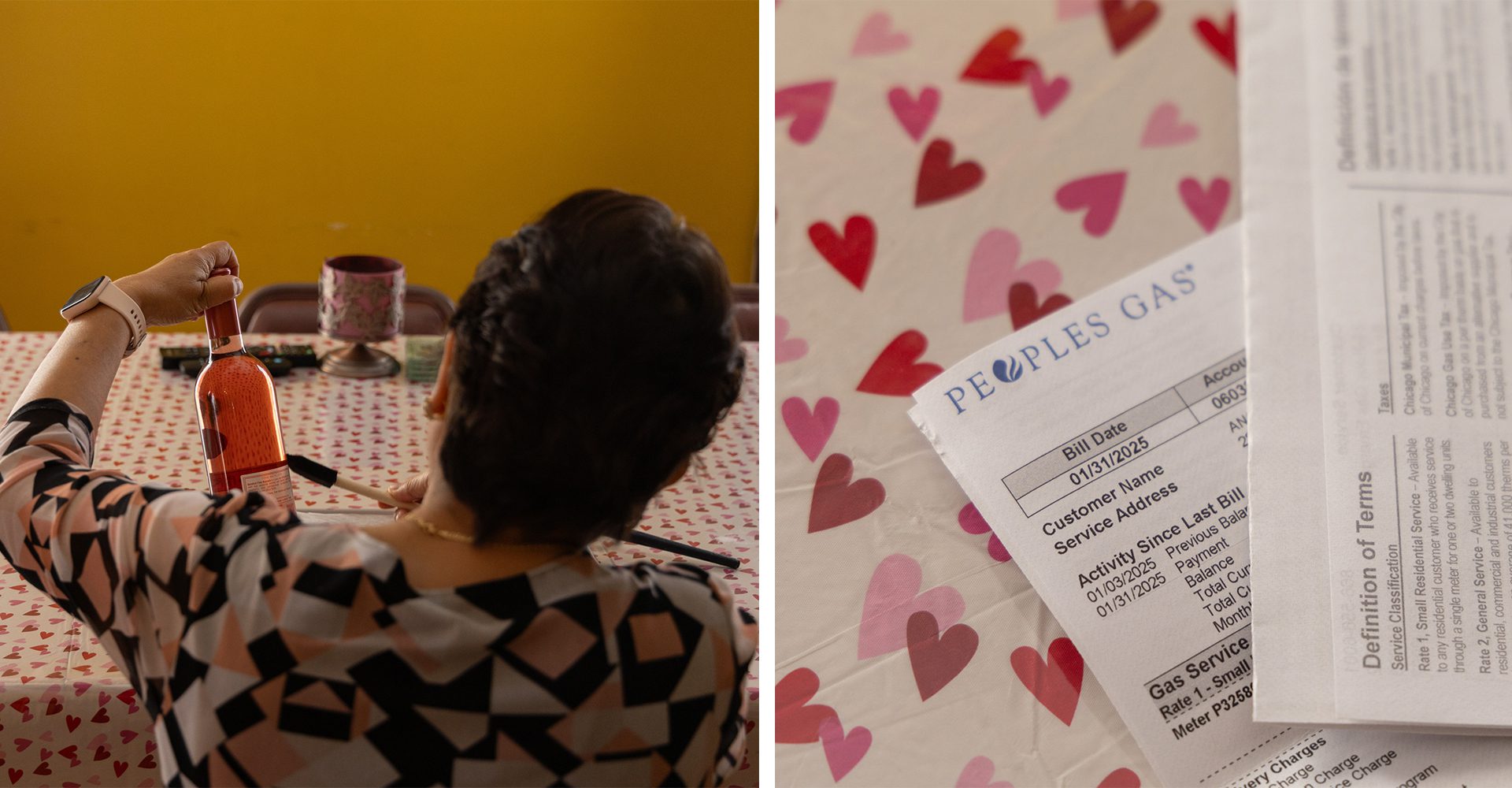
It’s money that Marin and others on low or fixed incomes say they hope to save, as constant rate hikes to fund the pipeline replacement program will make it increasingly difficult to pay their bills.
”I didn’t want to believe it, but it does affect you psychologically to be thinking: ‘How am I going to pay for this?’” said Marin, referring to her $1,000 bill.
For now, Marin said she is looking at options for reducing her gas usage at home, hoping to install a heat pump and an induction stove.
“I prefer and would like to transition [to electric],” said Marin.
Aydali Campa is a Report for America corps member and covers environmental justice and immigrant communities for Borderless Magazine. Send her an email at [email protected].
